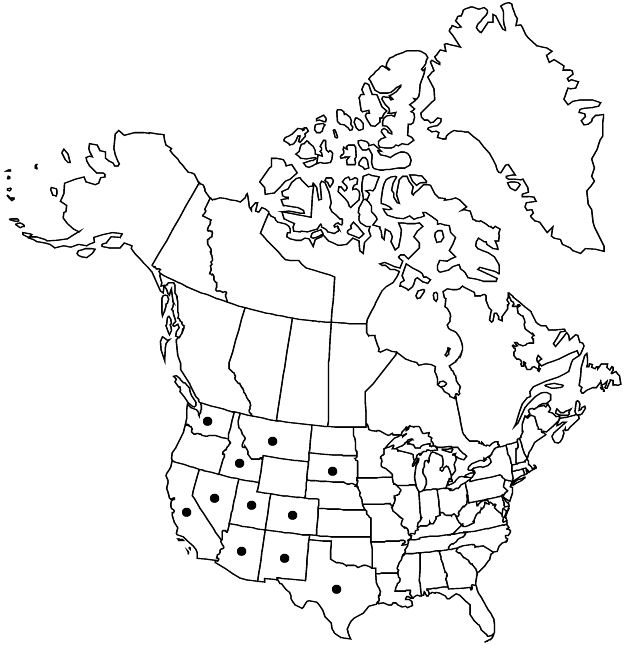Difference between revisions of "Petrophytum caespitosum"
Mem. New York Bot. Gard. 1: 206. 1900.
FNA>Volume Importer |
imported>Volume Importer |
||
| Line 37: | Line 37: | ||
-->{{Treatment/Body | -->{{Treatment/Body | ||
| − | |distribution= | + | |distribution=Ariz.;Calif.;Colo.;Idaho;Mont.;N.Mex.;Nev.;S.Dak.;Tex.;Utah;Wash.;ne Mexico. |
|discussion=<p>Subspecies 2 (2 in the flora).</p><!-- | |discussion=<p>Subspecies 2 (2 in the flora).</p><!-- | ||
--><p><i>Petrophytum caespitosum</i> primarily inhabits arid rocky outcrops and talus slopes at high elevations in mountain ranges of the western United States and northeastern Mexico.</p> | --><p><i>Petrophytum caespitosum</i> primarily inhabits arid rocky outcrops and talus slopes at high elevations in mountain ranges of the western United States and northeastern Mexico.</p> | ||
| Line 68: | Line 68: | ||
|basionyms=Spiraea caespitosa | |basionyms=Spiraea caespitosa | ||
|family=Rosaceae | |family=Rosaceae | ||
| − | |distribution= | + | |distribution=Ariz.;Calif.;Colo.;Idaho;Mont.;N.Mex.;Nev.;S.Dak.;Tex.;Utah;Wash.;ne Mexico. |
|reference=None | |reference=None | ||
|publication title=Mem. New York Bot. Gard. | |publication title=Mem. New York Bot. Gard. | ||
|publication year=1900 | |publication year=1900 | ||
|special status=Illustrated | |special status=Illustrated | ||
| − | |source xml=https:// | + | |source xml=https://bibilujan@bitbucket.org/aafc-mbb/fna-data-curation.git/src/bb6b7e3a7de7d3b7888a1ad48c7fd8f5c722d8d6/coarse_grained_fna_xml/V9/V9_697.xml |
|subfamily=Rosaceae subfam. Amygdaloideae | |subfamily=Rosaceae subfam. Amygdaloideae | ||
|tribe=Rosaceae tribe Spiraeeae | |tribe=Rosaceae tribe Spiraeeae | ||
Revision as of 00:32, 28 May 2020
Shrubs, 1–10+ dm diam. Stems prostrate or decumbent, loosely intertwined, 1–4+ cm, and erect or ascending, tightly coalesced, 0.2–0.5 cm, internodes 0.1–1 cm. Leaves: blade spatulate, 0.4–1.8 × 0.2–0.4 cm, venation rarely visible except on long-shoot leaves, 1(–3)-veined, apex acute, abaxial surface pilose to sericeous, rarely sparsely strigose on lamina and veins. Panicles widely branched to compact and racemose, [0.5–]1–15[–20] × 0.5–6 cm, sericeous; bracts subulate to narrowly obtrullate, 3–8 mm, pilose to sericeous. Pedicels 0.5–2.5 mm; bracteoles 1, extending from middle to well beyond apex of sepals. Flowers 3–6 mm diam.; hypanthium 1 mm, densely sericeous; sepals erect, ovate-lanceolate, 1–1.5 mm, margins sericeous, abaxial surface sericeous to tomentose; petals narrowly oblanceolate, 1–2.5 mm, apex obtuse to slightly cleft or acute to acuminate; stamens 20, lengths 1.5–2(–2.5) times petals (1.5–3 times sepals); carpels (3–)5(–6), adaxially connate. Follicles 2 mm. 2n = 18.
Distribution

Ariz., Calif., Colo., Idaho, Mont., N.Mex., Nev., S.Dak., Tex., Utah, Wash., ne Mexico.
Discussion
Subspecies 2 (2 in the flora).
Petrophytum caespitosum primarily inhabits arid rocky outcrops and talus slopes at high elevations in mountain ranges of the western United States and northeastern Mexico.
Selected References
None.
Key
| 1 | Leaf blades 0.4–1.4 cm, abaxial surfaces pilose to sericeous; petal apices obtuse to slightly cleft. | Petrophytum caespitosum subsp. caespitosum |
| 1 | Leaf blades 1–1.8 cm, abaxial surfaces sparsely strigose; petal apices acute to acuminate. | Petrophytum caespitosum subsp. acuminatum |